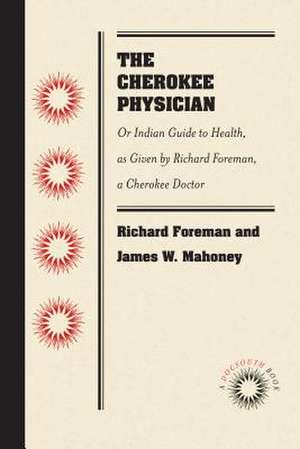The Cherokee Physician
Autor Richard Foreman, Jas. W. Mahoneyen Limba Engleză Paperback – mai 2018
The volume has intrigued homeopathic practitioners through the years, and attracted the interest of contemporaneous practitioners, including, for instance, one doctor who wrote to the Therapeutic Gazette (September 1881) to enthusiastically endorse its cure for gravel through Gravel Weed (Actinomeris Helianthoides). Gravel translates to kidney stones in contemporary parlance; modern homeopathic sources say little about the common flower's use as a diuretic, furnishing one example of knowledge in The Cherokee Physician that has escaped modern evaluation. The book offers, by slant, interesting ethnographic observations, equally unproven.
A DOCSOUTH BOOK. This collaboration between UNC Press and the University of North Carolina at Chapel Hill Library brings classic works from the digital library of Documenting the American South back into print. DocSouth Books uses the latest digital technologies to make these works available in paperback and e-book formats. Each book contains a short summary and is otherwise unaltered from the original publication. DocSouth Books provide affordable and easily accessible editions to a new generation of scholars, students, and general readers.
Preț: 256.70 lei
Nou
Puncte Express: 385
Preț estimativ în valută:
49.12€ • 51.42$ • 40.64£
49.12€ • 51.42$ • 40.64£
Carte tipărită la comandă
Livrare economică 07-21 aprilie
Preluare comenzi: 021 569.72.76
Specificații
ISBN-13: 9781469641720
ISBN-10: 1469641720
Pagini: 352
Dimensiuni: 152 x 229 x 21 mm
Greutate: 0.57 kg
Editura: UNC at Chapel Hill Library
ISBN-10: 1469641720
Pagini: 352
Dimensiuni: 152 x 229 x 21 mm
Greutate: 0.57 kg
Editura: UNC at Chapel Hill Library
Descriere
The extended title of The Cherokee Physician serves as an apt summary of its contents. The book was the result of a remarkable collaboration between James Mahoney, an Irish American and native Tennesseean, and Richard Foreman, whose parental ancestry was probably Scottish and Cherokee. Typical of its time, the book dispenses moral advice as cheerfully as medical advice.
